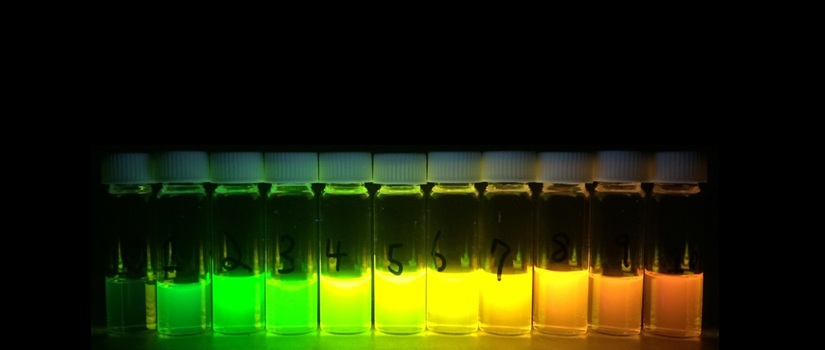Andrew B. Greytak Group Site
Experimental physical and materials chemistry, with a focus on nanocrystal surfaces.
Our lab explores the formation, physical properties, and interfacial chemistry of
nanoscale materials. Materials that we make in our lab include nanocrystal quantum
dots (QDs) superparamagnetic oxide nanocrystals; we also examine a variety of other
low-dimensional materials in collaborative projects. A strong inspiration for this
work is the opportunity to impact fields including energy conversion, energy storage,
bioimaging, and biomedicine.
There are two general themes that guide our choice of problems. One is an attempt
to develop surface-sensitive metrics, purification strategies, and synthetic steps
for QDs and other colloidal nanocrystals that permit increasingly precise and sophisticated
control of the resulting physical and chemical properties. Such control is necessary
for improving the performance of QD solar cells and other nanocrystal-based devices,
and for advancing the biomedical applications of nanocrystal-based imaging and therapeutic
agents. The second concerns the transport of matter, charge, and energy within nanoscale
systems and across interfaces. We use microfabrication, optoelectronic measurements,
and functional imaging techniques to characterize these transport processes. These
themes are explored in several project areas.
Graduate and undergraduate students with a variety of academic interests including
physical, inorganic, and organic chemistry; physics; biological sciences; and electrical
engineering will be able to make strong contributions to the group’s research. Group
members employ techniques including air-free synthetic chemistry, NMR spectroscopy,
calorimetry, chemical vapor deposition, scanning and transmission electron microscopy,
microfabrication, and photoluminescence imaging and spectroscopy. Instrument control,
data analysis, and technical image analysis is done with computational tools such
as Matlab and Image-J.
Undergraduates interested in research opportunities should contact Prof. Greytak directly
with a CV and a note regarding your professional goals. Prospective graduate students
are advised to consult the Department’s graduate admissions page
News and Highlights

URI students making waves
The College of Arts and Sciences First Year Undergraduate Research Initiative, led
by Profs. Simoska, Hosseini, and Fountain, puts first-year Chemistry and Biochemistry
majors on the fast track to independent research by building common lab skills in
chemistry prep and spectroscopy, and then linking them up with projects in participating
research labs like ours. Veby Youssef, Camilla Morgan, and Connor Dow joined our lab
this Spring with Jennii Burrell and Moinul Islam as mentors. Here’s our excitation-emission
setup: some assembly required!

Welcome Farjana and Nuwandi
First-year Chemistry graduate students Farjana H. Mitu and Nuwandi K. Jayasekara have
joined the lab!

Group trip to One Eared Cow Glass
Quantum Dots were first explored as pigments in glass, so we took a group trip to
One Eared Cow Glass here in Columbia to learn about the other kind of glassware and
some of the chemistry inside it!

2023 Nobel Prize in Chemistry awarded for Quantum Dots
Congratulations to Alexei Ekimov, Louis Brus, and Moungi Bawendi … and the work of
the many colleagues, students, and entrepreneurs who have helped to demonstrate the
beauty and significance of these tiny, shiny crystals! An excellent history of quantum
dots is described in this Nano Letters perspective by Brus and Alexander Efros:

Welcome to Dr. Gryphon Drake
Gryphon joined the College of Arts and Sciences as a postdoctoral associate in July
2023, having completed his PhD at the University of Illinois with Prof. Moonsub Shim.
He will be conducting research on semiconductor nanocrystal ligand exchange chemistry,
and also teaching Chem 141M in Spring 2024.





